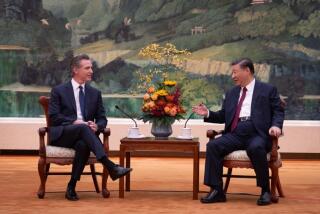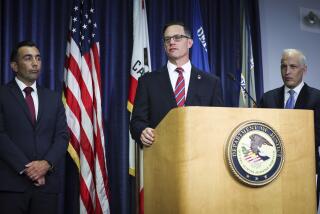Admiral Sails a Steady Course on China
- Share via
HONOLULU — Americans like their military leaders rough, tough and gruff. George Patton is an American legend, as is Stormin’ Norman Schwarzkopf. So I don’t know if America is ready to buy into an admiral who might be viewed as some kind of military dove. But I hope so. Please meet Adm. Joseph Prueher, the commander in chief of all U.S. forces in the Pacific--in charge of all those ready-to-fight Marines, pilots, commanders and sailors. This military man has a non-stereotypical attitude about dealing with a potential foe. He believes that the most prudent policy toward those who might someday have the capability to harm us is to try to understand them now, though without kowtowing to them, to meet them halfway rather than tell them to stuff it, to make diplomatic love, as it were, rather than resort to the cruel finality of war. And, about the need to do this in the case of China, the Nashville-born Naval Academy graduate is passionate and is willing to put his reputation on the line.
I was thinking about this modern military man as I cautiously tiptoed down a tiny ladder into the bowels of the Columbus, a nuclear attack submarine docked here in Pearl Harbor. For in the cluttered control room, amid shelves of sonar equipment, was the good old periscope. Up it went, and I was shown how to maneuver it, focus on a target and adjust magnifying lenses so powerful that it seemed I could have helped solve the newspaper crossword puzzle in the hands of the worker lounging on the dock hundreds of yards away.
Sailors know that nothing beats being able to see with your own eyes, and this admiral also likes to see things for himself. Since he took command in January 1996, he has been to China four times, and what he has seen is an increasingly capable country quickly modernizing the People’s Liberation Army. “PLA soldiers down to the army captain level are outstanding,” Prueher says. “The senior leadership is smart, pragmatic and patriotic. And their strategic rocket forces are able and well- funded.” The Chinese military returns the compliment by allowing him unique access. During one Chinese training exercise, Prueher viewed new equipment and installations heretofore off-limits. But despite increasing military-to-military contacts between the PLA and the Pacific Command, both here and in China, Prueher accepts that it’s always possible that China--or for that matter America--could turn on the powerful nation it now eyes warily across the Pacific. “I try not to get too rosy a glow,” he says. “I’m paid to be skeptical.” Still, he pointedly disarms pessimists who view future conflict with China as inevitable by saying to them: “You could be right. Maybe they will try to nail us in 15 years. But if you stiff them at every turn between now and then, you guarantee that they may try to do that in 15 years.” America, despite its differences with China, must offer true respect or it will get nowhere. “The U.S. is the world’s youngest major power; China is the world’s oldest major power,” he said, diplomatically, in a Beijing speech. “Clearly, there is much we can learn from each other.”
Although it could unravel at any time, Prueher’s relationship with his Chinese counterparts may be the most interesting untold story of the Sino-U.S. relationship. In his Pearl Harbor office last week, he said: “They deserve a lot of respect. Most Americans do not understand the challenges presented by 1.32 billion people.” Privately, Prueher does not think time is on the side of a leisurely approach to this crucial relationship, which is why he is willing to stick his neck out as America’s point man in the Sino-U.S. military dialogue so that “the relationship isn’t destroyed when something goes wrong. Do you know that when trouble over the Taiwan Strait broke out [in March 1996] I had not one person over there I could call?” Now he has his own little (black) red book; the Chinese military probably talk to him more than to any other American. He wishes they would talk to him even more, wishes that the U.S. and China could candidly discuss extremely sensitive and topical common worries like shaky Indonesia and its sulky President-Seemingly-for-Life Suharto, 76, who is to be rubber-stamped by the electoral congress this week for yet another five-year term. What if the old general falls anyway, civil war ensues and a vengeful majority starts slaughtering the economically successful ethnic Chinese minority? “We’re not at any level of discussion” about anything approaching a joint rescue operation, he admits.
Prueher’s Pacific profile inevitably reminds one of Richard Nixon, though of course the admiral knows full well that he serves the commander in chief, doesn’t and shouldn’t have a president’s options and needs to sing from the same hymn book as America’s civilian leaders, not offer solo performances. Still, this military man does appear to have China’s ear, and all we can hope is that the People’s Liberation Army will meet him at least halfway. Will they? As any Navy officer might say, all you can do is keep your powder dry, head out of port full steam ahead, and up the periscope to see for yourself.
More to Read
Sign up for Essential California
The most important California stories and recommendations in your inbox every morning.
You may occasionally receive promotional content from the Los Angeles Times.













